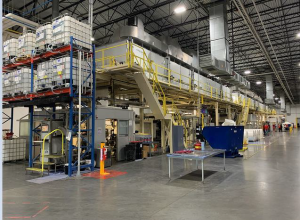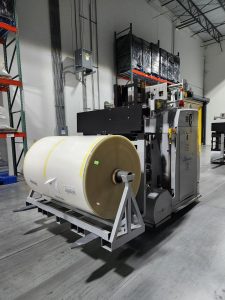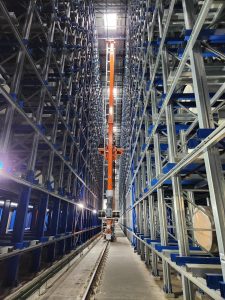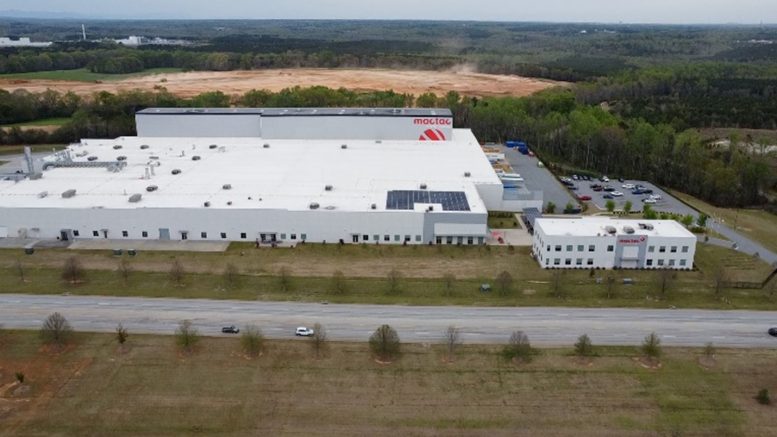Mactac, a prominent supplier of pressure-sensitive adhesives (PSAs), operates a 370,000-square-foot facility in Moore, South Carolina, conveniently located near highway 290.
Acquired in 2021, this plant joins their network of six manufacturing sites. Here, they produce large roll labels and graphic/signage materials. Chances are, you encounter their products daily! Mactac’s labels and adhesives find applications across multiple industries, including cosmetics, toiletries, household goods, food, and beverages. This facility utilizes impressive production equipment and state-of-the-art material handling automation.
Shortly after the Moore plant acquisition, Mactac joined the OpExChange, and their team have been regular participants in the collaborative and learning events. During the past two years they have seen significant changes in their facility, driven largely through process improvement, waste reduction, and fostering a strong team culture. On June 4th, 2024, they proudly hosted their first OpExChange plant visit.
Thirty OpExChange members from across the state participated in the plant tour which detailed their improvement journey. Josh Ziska, the site’s Continuous Improvement Manager, facilitated the visit. Delton Vereen, the plant manager, provided a company history, product overview, operational details, and, most importantly, showcased key results from their continuous improvement efforts.
Delton graciously stated that there were a lot of “opportunities” for improvement when he started here as plant manager two years ago. By implementing core lean principles, leveraging their team’s creativity, and capitalizing on impressive automation, they have achieved impressive results. He acknowledged that their CI journey is just beginning and that he looked forward to suggestions from the visitors on further improvements. Delton and his team led the OpExChange group through a comprehensive presentation detailing their site’s journey and the impactful improvements they’ve made. This was followed by an in-depth, hour-long tour showcasing their operations which is comprised of four primary areas: Coating Operations, Converting Operations and Distribution, and the Ferretto automated warehouse.
Coating Operations
 Upon entering the Coating Operations area, you will see a large vertical “tank farm” with several chemical cylinders. Two store wastewater, while the others hold adhesives used in the coating processes. Different adhesives are needed based on the final product’s application and they have several formulations.
Upon entering the Coating Operations area, you will see a large vertical “tank farm” with several chemical cylinders. Two store wastewater, while the others hold adhesives used in the coating processes. Different adhesives are needed based on the final product’s application and they have several formulations.
For example, milk or orange juice containers require adhesives suitable for refrigerated environments, while labels for transparent products like water bottles need clear adhesives. Final product aesthetics are paramount for both Mactac and their customers.
Three large continuous coating lines operate in this department. The largest stretches roughly the length of a football field, while the smallest is half that size. Their speeds vary depending on the material combinations used for the final application, but it they are capable of running as fast as 500 feet per minute.
The first coating line, called the “Cast line,” produces the “facestock” used on graphic labels. This is the base material layer that forms the printable surface of the label. This continuous operation unwinds a roll of vinyl, applies coating via a coating head, runs it through dryers, and finally rewinds it at the end. The finished roll is then ready for the next coating line.
Two massive coating lines apply adhesives and liners to the facestock roll. Both are large, continuous operations. Facestock rolls are unwound at one station, while liner stock is unwound at another. A coating head applies adhesive to the liner, which in turn travels through a long drying section. The coated liner and facestock are then laminated together. After an automated inspection, the material is rewound into a large Master Roll Sheet (MRS) ready for distribution, storage, or further processing in the Converting department.
Converting Operations
The Converting department efficiently transforms large master rolls of material into smaller, finished labels. This process involves five slitter machines: three dedicated to large rolls (capable of producing widths as narrow as 3.5 inches) and two dedicated to graphic labels. These high-speed machines, reaching speeds of up to 2,400 feet per minute, precisely cut the wide material into narrower rolls. The finished rolls are then palletized, shrink-wrapped, and queued for distribution. Additionally, this department also converts master rolls from other Mactac locations.
Industry 4.0 in Action: Laser-Guided Forklifts
 Safety is a top priority at Mactac, especially in areas with traditionally high risks such as forklift-pedestrian interaction. To address this, they have implemented a fleet of ten state-of-the-art laser-guided vehicles (LGVs) that function as driverless forklifts.
Safety is a top priority at Mactac, especially in areas with traditionally high risks such as forklift-pedestrian interaction. To address this, they have implemented a fleet of ten state-of-the-art laser-guided vehicles (LGVs) that function as driverless forklifts.
These 15,000-pound robots, capable of carrying up to 6,000 pounds of cargo, transport large rolls and other material throughout the facility: from storage to converting lines, finished goods, and distribution.
While LGVs possess advanced safety features like multiple obstacle-detecting sensors that minimize human error, EHS leader Mike Cownie emphasizes that caution remains crucial. LGVs follow designated paths, and pedestrians must stay in designated areas and exercise care when crossing these routes.
Additionally, all powered vehicles in the facility, including LGVs, are capped at a maximum speed of six miles per hour for optimal safety.
Fully Automated Ferretto Warehouse
 The first thing that catches your eye as you pull up to the facility is the towering, automated warehouse. It’s a massive system, reaching 120 feet high, 590 feet long, and 100 feet wide.
The first thing that catches your eye as you pull up to the facility is the towering, automated warehouse. It’s a massive system, reaching 120 feet high, 590 feet long, and 100 feet wide.
It was also one of the highlights of the tour. Inside, four cranes move traverse throughout the warehouse, transporting both the raw material rolls, rolls to be processed, and finished labels. This vertical warehouse can store a large amount of material – up to 16,000 large rolls of materials and 15,000 shelves for finished labels.
Even more impressive than its size are the benefits it brings to the site. First, it keeps everyone safe by separating the people working there from the machines that move the materials. Second, it saves time by getting rid of unnecessary walking and searching.
Finally, it uses the space very efficiently by having narrow aisles and making use of thirteen stories of vertical space.
CMMS: Moving from Reactive to Proactive
Delton had shared that there were a lot of opportunities when they began this improvement journey. But where to start? He set his sights on maximizing equipment uptime. Delton understood that reactive maintenance, fixing things after they break, was definitely a problem. His vision was to implement a proactive system that would prevent problems, leading to increased production and reduced maintenance costs.
To tackle the issue head-on, Delton saw an opportunity in Cameron Keats, a new Reliability Engineer. Delton challenged him to improve the situation: overhaul their maintenance approach and implement a proactive system. Joining Mactac in 2022 with both the skillset and the drive, Cameron was well-suited for the task. At the time, the facility lacked a structured preventive maintenance program. While there were some basic preventive maintenance procedures being performed (around 150), these were undocumented and lacked a feedback loop for analysis and improvement.
Cameron, now the Manager of Reliability and Maintenance, readily accepted, understanding the potential benefits. The solution? A Computerized Maintenance Management System (CMMS). This system provided the framework Cameron needed. Over 2022 and 2023, he and his team documented and loaded over 1,200 preventive maintenance tasks into the CMMS.
The results are impressive. By tracking proactive (preventive) versus reactive (repair) work orders, they saw a significant shift. In 2023, reactive maintenance accounted for 42% of work orders. But in 2024 (so far), that number has dropped to 24%. An even more impactful metric is labor hours spent on these work orders. In 2023, 59% of maintenance labor was spent on reactive work orders. This year, that number has been reduced to 30%. More effort is now being made to prevent future problems rather than reacting to problems after they have occurred.
These improvements translate directly to the production floor. With less downtime for coaters and slitters, Mactac is experiencing increased overall efficiency.
Practical Analytics
Josh Ziska serves as the Continuous Improvement Manager at the site and is actively involved with OpExChange. In August 2023, Josh attended an OpExChange workshop on Practical Analytics. This four-hour, hands-on course, conducted by Gemba Systems, was provided free of charge to OpExChange members. Participants learned to use Microsoft Power BI to automate data analytics tasks and create actionable reports and dashboards.
Josh enthusiastically shared, “I absolutely fell in love with it because it could potentially solve a lot of problems I was currently working on.” Upon returning to his plant, Josh began applying his new knowledge, and by October, he had developed interactive dashboards using the CMMS data collected by Cameron.
During a demonstration, Josh showcased a report used to analyze maintenance data, highlighting the tool’s ability to identify recurring issues. He illustrated one case where a corrective action was quickly implemented, yet it occurred seventy-six times in one quarter. He noted, “These are just a little bit painful, but for a lot of occurrences.” Power BI not only identifies these issues but also allows for a deeper investigation into potential causes. Josh shared five success stories where the quick visibility of data uncovered problems that might have otherwise been missed. To the visiting OpExChange members, he emphasized, “This is a powerful tool. If you are not already using it, you should be.”
Waste Reduction: Achieving Results
Delton concluded his presentation with a summary of their two-year waste reduction journey, addressing the aspect of an OpExChange visit that all attendees eagerly anticipate – the tangible results achieved from the implemented actions. Delton shared that in 2022, the site faced approximately $16 million in actual waste losses, stemming from issues in quality, scrap, equipment performance, and inventory management.
To tackle these challenges, the site launched a comprehensive campaign, which included town hall meetings, revamped tier meetings, and aligning organizational goals with relevant activities. This was an “all-hands on deck” which required a lot of communication with the workforce and empowering the engagement of the team. As they made improvements and employees saw the benefits in how their lives were improved, trust grew as did overall morale.
Delton shared some high-level achievement that demonstrated the bottom-line effectiveness of their efforts thus far:
- Coating waste in 2024 YTD is 18% lower than 2023 levels.
- Slitting waste in 2024 YTD is 62% lower than 2023 levels.
- Total waste for the plant was reduced by 38% in 2023 and is on track to reduce by 43% of 2023 levels in 2024.
- The site is set to beat its actual 2023 waste levels in 2024 while also producing higher production volumes.
These annual savings are substantial and are quantifiable in several millions of dollars.
Operational Excellence that Sticks
The recent OpExChange visit to Mactac showcased a great example of continuous improvement in progress. This facility exemplifies pursuit of excellence across various areas, including safety, automation, and waste reduction. While humbly acknowledging room for growth, their pride in their team and achievements shines through. Mactac’s impressive use of automation also stands out, not just for efficiency, but also for enhancing safety for their workforce. This, coupled with the effective empowerment of talent like Cameron and Josh, showcases their commitment to a smarter and safer workplace.
A key factor in Mactac’s success so far is a leadership team that works cohesively, aligning their activities with the entire operation and transparent communication. The vision that Delton shared during the visit presents a clear path for their progress to sustain this momentum. As long as Mactac adheres to this path, their operational excellence efforts will stick.
Mactac does goes beyond simply pursuing operational excellence at their plant. They embody the spirit of OpExChange. They actively participate and learn from events, but more importantly, they give back to the community. Josh Ziska exemplifies this commitment. He not only quickly implemented Power BI at his plant but has already scheduled follow up sessions with four of his OpExChange peers for a deeper dive into how to get started. This willingness to share knowledge fosters collaboration and ensures that OpExChange’s mission of empowering South Carolina manufacturers is truly realized.
About Mactac
For more than 60 years, Mactac has been a leader in the pressure-sensitive adhesive (PSA) industry. With a spirit of innovation that dates back to our inception, we are a full adhesive provider equipped with acrylic and rubber adhesive chemistries and all adhesive technologies, including hot melt, solvent, emulsion, and UV. We are a vertically integrated organization comprised of six divisions — each specially designed to meet the unique needs of our customers. Our innovative pressure-sensitive adhesive materials are used in a wide range of markets, including label printing, graphic design, packaging, retail display, fleet graphics, automotive, medical device assembly, and more. Our technology and service are world-class. Our organization is built on honesty, integrity, and reliability. We are experts in our field. And we do whatever it takes to help you find the best solution for your pressure-sensitive needs. It’s easy to do business with Mactac. https://www.mactac.com/
About OpExChange
The OpExChange, sponsored by the South Carolina Manufacturing Extension Partnership, is a peer-to-peer network of manufacturers and distributors in South Carolina known for generating success for members through benchmarking and best practice sharing. Member companies host events and share practical examples of industrial automation, lean manufacturing improvements, and leadership development. It is an invaluable resource to South Carolina companies that provides access to others who are on similar improvement journeys. If your company is interested in participating in this collaborative effort to improve both the competitiveness of your operation and South Carolina, contact Mike Demos (Mike@OpExChange.com). More information and upcoming plant visits are available on the OpExChange website www.OpExChange.com.


Be the first to comment on "Mactac in Moore: Sticking with Automation and Continuous Improvement"